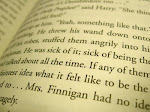
It seems to be a recurring pattern here- if you write a book about a world that scares people, you're going to find those who want to ban it. It's happened with so many books I've read- The Giver, which I've recently reviewed, as well as the novels of George Orwell, Brave New World by Aldous Huxley, and a book I've recently finished, The Handmaid's Tale by Margaret Atwood. The latter of these books is a whirlwind, and it ties with 1984 as the one that scares me the most.
It's simple: imagine a world where women have absolutely no rights. They are not allowed to read or write. They are given positions and ranks, and if you don't follow the rules you're banished to either serve men akin to a prostitute or slowly die in a cloud of toxic fumes. Perhaps the most thankless job is that of the Handmaid, a glorified breeder who services the highest-ranking men, or Commanders, by giving them children. There's no pleasure in the sex, or the "Ceremony," and the wife of your Commander hates you on principle. This is the life that the main character, Offred, lives. It's only by the grace of God, or a higher being elsewhere, that she can even remember her husband and daughter.
The Handmaid's Tale is a scary look at what is true for very many societies today- not the exact replica of real-world societies, but close enough. To think that in another country I, as a woman, would not be allowed to read, or would be given my father's name- Offred= Of Fred, Ofglen= Of Glen, etc.- or even in this one in the future, shocks me to my bones. After reading this full-to-the-brim novel, I find myself perhaps more affected than when I read 1984 (about a society ultimately unable to think for itself- men and women alike), simply because the society Atwood created targets women specifically. We, in her story, have become the servants of men. Granted, we still govern mainly among ourselves, but we have no true power to speak of.
This powerful book is peppered with sexual innuendos, suicide references, and some swear words, all used to convey the dire sense of oppression and desperation Ofglen and her fellow women feel in this world. Consequently, the Judson, TX school superintendent at first banned the book from AP English classes, only to see the ban overturned by the school board after parents, teachers and students appealed. Upper Moreland, PA schools also downgraded the novel to "optional", rather than "required" reading material for 11th graders for "age-inappropriate" material. (Also see here for a complete description by one group as to why the book should be removed from classrooms. ) The sex in this book is merely for procreation, not for enjoyment, whereas the allusions to death, except for a couple of graphic descriptions, are simply that- allusions. The profanity in this book is spoken by all adult characters, and it is no more than what you'd expect from typical highschoolers. Overall, I can't see why parents or school officials would think that this book is age-inappropriate when much worse is being shown on TV and in music videos.
As for the writing, Atwood's prose is dripping with metaphor, description and flowery language that at times is hard to follow. You will have to read passages and sometimes even single sentences a second time just to digest all that is being said. Some aspects of the plot could have been better laid out- I think Offred's former husband Luke, as well as their daughter, and their whereabouts could have been more thought into, rather than just sticking with her life with the Commander and his wife, former singer Serena Joy. However, Atwood gets her point across very well, and paints a portrait of a world none of us could ever think real, but (once again) is very close to the truth in some poorer countries, as stated before. I would recommend this book only if you enjoy reading deeper, more complicated stories, or are looking for a book that will occupy your time- the way I read it, hungrily in two days, is not really the best way to go. I'll be rereading it somewhere along the way, most likely.





No comments:
Post a Comment